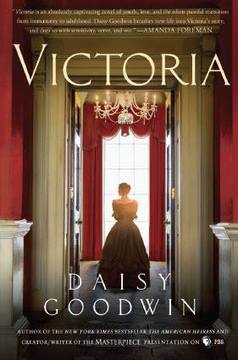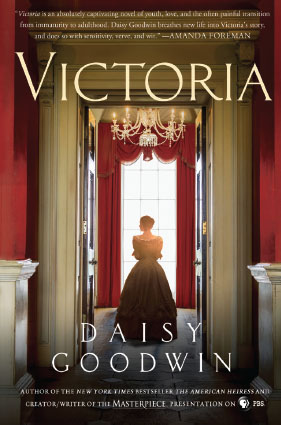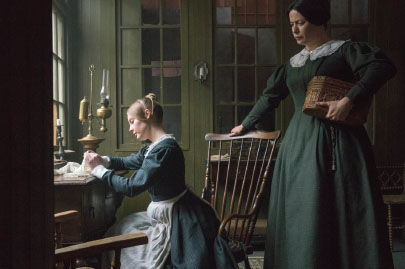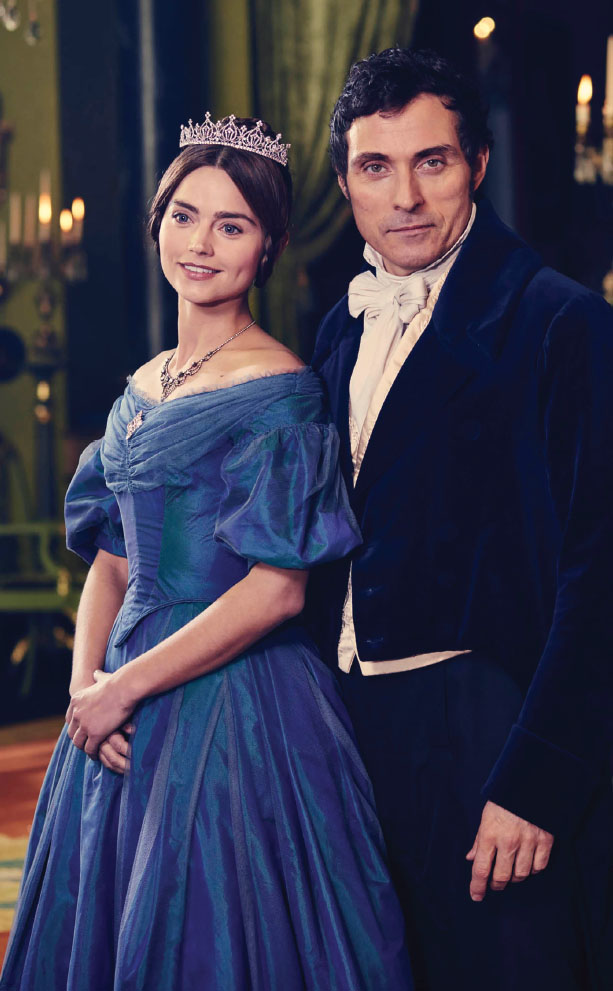
Daisy Goodwin could be forgiven for taking her foot off the gas following a hugely successful career. With Victoria entering its third season, however, she shows no signs of slowing down anytime soon. We were lucky enough to sit down with the writer for an interview.
“No, she did apologize,” New York Times bestselling author Daisy Goodwin (The American Heiress, The Fortune Hunter) insists. This is after I mention an article in the British press that claimed Victoria refused to do so in real life to dying, wronged Lady Flora. “It’s in the diaries. She goes to see Lady Flora and apologizes and then she comes out and Lord Melbourne says, ‘You weren’t in there very long, ma’am,’ and she says, ‘I was in there long enough,’ so she absolutely did.” Hearing her effortlessly quote passages from Victoria’s diaries, I’m certain she’s right—and that the creator, writer and executive producer has spent quite a bit of time studying those volumes. She spoke to BHT about both her novel, her show and the woman who inspired them both.
READ: The legacy of Queen Victoria and her 60 year reign
British Heritage Travel: I love the scene in both of the book and the show when she finds out she’ll be queen and runs down in her nightgown like the young girl she is. I thought it set the tone for both properties. Was that the first image for you?
Daisy Goodwin: Yes, I guess it was. Actually, I think the first image in my head was her waking up and she's lying on this cot, and her mother's in the big bed. She can hear her mother snoring and then there's the knock at the door. But I think the fact that she's running, and she's running free, and she doesn't have to hold her governess’s hand as she walks down the stairs—it’s a huge thing for her. Up until that point, she had to hold Baroness Lehzen's hand every time she walked down a flight of stairs.
BHT: Knowing that, I was expecting her to be a little dominated at first, but that wasn't true at all. She actually immediately took hold of her power. Where did that strength come from?
DG: I think she had been biding her time. She thought it was very unjust the way she'd been treated, and she knew that the moment she was Queen, everybody would have to do what she said. She'd just been waiting for that to happen. She had a very strong sense of self, Victoria. You never get the sense reading her diaries or reading about her that she's frightened. I think quite reverse: I think she was always very happy to put herself out there. So I don't think she had Stockholm syndrome. She just had an enormous strength of character.
BHT: There’s a liveliness, a youthful energy, in both the book and the TV series that kind of mirrors Victoria's. Was that important to you?
DG: Oh yeah definitely! I wanted people to see that she was a teenager. A very passionate, kind of engaged, excitable teenager. Because when we think of Victoria, we think of an old lady in a bonnet who's always wearing black—who’s miserable and mourning her husband. But at the beginning of her reign, she was a young, sprightly girl who loved dancing and dogs and good looking men.

ALL PHOTOS COURTESY OF ITV PLC AND MASTERPIECE
READ: The truth about Queen Victoria's relationship with John Brown
BHT: A lot of historical fiction, when the subject is a woman, is about showing or reclaiming her power—because history has portrayed them as silly or feckless. With Victoria, in a way, it’s almost the opposite. We've always known about her power, and you're reclaiming her humanity, her youth, her vibrance.
DG: That's a very good point. I think the thing with Victoria is that because she was on the throne for so long, her image became ossified in the last few years of her reign. People think of her as a sort of grandmother of Europe, an elder stateswoman. I thought it was important to see how hard it was for her to get there, and the process by which she became a great queen.
It was a funny, unpromising start. She didn't do brilliantly in the first couple of years of her reign. She was the first queen ever to get married and have children while she was queen. In a sense, she was sort of the first working mother. I think that's a really extraordinary achievement: to have nine children and a happy marriage and still be queen. I mean, yes, she had Albert to help her out, but I think it's fairly extraordinary. I just wanted to sort of put the woman back into Victoria. She is often portrayed as somebody who is humorless and prudish, none of which she was. She had a great sense of humor. She was very interested in sex. I wanted to kind of claim her womanliness back—and her femininity.
One of the things that happened is that after she died, people edited her diaries and her letters to kind of take out all the stuff that she said about…all the female stuff as it were. The yucky female stuff about childbearing and so forth. They edited it out. I wanted to put back a bit of that. Moreover, when I first found Victoria's diaries, I was a student myself, and reading them when I was about the same age she was. It was very interesting to discover this girl who was just as interested in men and parties and so forth as I was. I suppose I've always felt a sort of little spark of recognition there. I don't know, I think it's very interesting to see a woman, how a woman deals with power, really.
BHT: I read that the idea occurred to you while you were talking to your own teenage daughter. A kind of terror at the idea of a teenage girl in power.
DG: Yes that was a part of it. I have a sixteen-year-old daughter who, like Victoria, is very small. She's only five foot. It was the combination of her shouting at me and the fact that she was so small. It made me just suddenly think, "Oh! What would it be like if she was not just a pain in the neck but also queen, and the most powerful woman in the world?” That's literally what happened to Victoria and her mother. At times I feel a bit sorry for her mother, but not really.
BHT: Her mother tried to gaslight her with John Conroy, and doubt her…
DG: Yeah, it wasn't so much gaslighting her, I think. It was just that she felt that Victoria was her ticket to power, and then it turned out that Victoria was not interested in sharing power with her mother. Her mother felt very pissed off, but that's the nature of the beast.
BHT: I assumed it was poetic license, giving her daughter King Lear as a present with “How sharper than a serpent's tooth it is. To have a thankless child!” highlighted. Sounded too dramatic to possibly be real life.
DG: No, totally true, totally true! The King Lear thing is true. A lot of it is true. I mean, there's some things obviously I've made up. [But] A lot of the detail is absolutely correct. The rats weren't true, but the King Lear thing was. The thing with the mother is that...in her diaries, it was all in code about what she felt about her mother. You have to go and read it quite carefully to find out what's going on.
READ: Is this Queen Elizabeth II's secret to good health?
BHT: Not that Victoria always acted so well herself, she was a very passionate, could be spiteful teenage girl. The way she treated Lady Flora…
DG: Yeah, the “Mean Girls” thing is obviously there. She was horrible to Lady Flora and I think her biggest…but she did have the courage to go and apologize. I think she did behave very badly, but she did also apologize so that's all I can say in her defense, really. I didn't want to portray someone who is perfect because she was not perfect at all.
BHT: I thought that was also poetic license. Some historians say she never apologized to Lady Flora.
DG: No, she did apologize. She absolutely did. It's in the diaries. She did apologize. There’s a diary. She goes to see Lady Flora and then she goes in and apologizes and then she comes out and Lord Melbourne said, "You weren't in there very long, ma’am,” and she says, "I was in there long enough.” So she absolutely did. I know I'm right on that.
BHT: You added a whole subplot to the television series that really isn't as developed in the book. A “Downstairs” element between Lehzen and Paige and Jenkins with schemes and a secret past. Was this just because the form, the different medium required it? More characters and a foil to what was happening with Victoria?
DG: It was really a question of length. I didn't want the novel to be too long. Also, I felt that the novel was a chance to really explore what was going on with Victoria and Melbourne and Albert. You didn't want to have too many points of view. If I'd done [the book] with all of the characters, it would have been a Dickensian length.

ALL PHOTOS COURTESY OF ITV PLC AND MASTERPIECE
BHT: How do the novel and TV series relate?
DG: I think they're companion pieces. In the U.K., it's come out after the program. People who read it, I think, really like the chance to go deeper into the characters. I think in the US, it'll go out before the program, so when they see the series, they'll get a whole different perspective. They're very different things and I've tried to make it, ya know, with Melbourne I've tried to go much deeper [with the book] into Melbourne and his motivations. I hope that they have their own pleasures, really.
BHT: They definitely do! Speaking of Melbourne, he is so extraordinary—so understanding of this young queen. He even forgave his wife for running off with Lord Byron!
DG: I know, I know! That's all true, again. He was a really extraordinary man, I think. A bit of a hero, really.
READ: Diana's legacy: A modernized monarchy
BHT: Did you feel like you've lucked out? Like I said, I kept googling things like, that just seemed too perfect, too dramatic—the domineering mother, the grotesque uncle with the evil scar plotting to steal her power. I actually found myself in disbelief that ...
DG: Yeah, I know. Seriously! I mean, why had no one done this before? It’s such a good story. I think they hadn't quite seen the potential maybe, because I've been quite obsessed with the story for a long time. So I kind of know a lot of the background. [Julian] Fellows concentrated on the love story [with The Young Victoria in 2009]. He didn't go there with the Melbourne story, which is a fantastic story. He didn't do the Flora Hastings thing. All those kind of other bits, which make it a much richer story, he left out. I think that's what makes it such a good story, and then you've got the sort of struggle between her and Albert for dominance and so forth. It’s fantastic! There's always some rich new scene. Like the brother its turns out, in real life, had syphilis. All kinds of plot developments!
BHT: What do you think is our fascination with Queens at the moment?
DG: People like queens. They’re interested in queens. There's probably a difference between a queen and a prime minister, maybe. There is a fascination in what women do when they're in power. Also, with Victoria and Albert, you have to feel that their marriage is in many ways a very modern one, because she's the breadwinner. She has all the power. He has to find a way of negotiating male pride with the fact that she's the boss. That is hard for any man, really. It’s even more difficult in the nineteenth century when women are—all women except Victoria—are their husbands’ property, basically, until the Divorce Act of 1857.
BHT: Were you surprised by anything is this new round of research? Did anything shock you?
DG: One of the things I found really extraordinary was how little she knew about birth control. She says when they get married how she really doesn't want to “get caught,” as she calls it, right away. She doesn't want to get pregnant. She wants to have a couple of years, to just enjoy being married. She gets pregnant, of course. She has a baby within nine months of the wedding. It’s fascinating how ignorant they were. It made her early married life really difficult because she loved going to bed with her husband, but every time she did, she got pregnant. Nine children, it's a lot of kids. It was a terrible strain on her.
BHT: So few writers get the chance to see their work actually made into a show with hundreds of their people involved. Seeing Jenna Coleman actually say your words…
DG: It's staggeringly exciting, I have to say. It's the best thing ever! I thought the best thing ever was seeing somebody reading your book on a train, but I can tell you the best thing ever is to walk down a street and see people through their windows watching your program on the telly as you walk by!
Being on set was incredible, it's a real thrill when you hear people, great actors do your words, make them into something so much better than you'd ever imagined. It's quite humbling, but it’s fantastic because actually writing novels is quite solitary. Writing screenplays, I really like because it’s a team process. My script is only as good as these actors, really, and the actors, thank god, are brilliant! They really give it an extra fifty percent. It’s a fabulous, fascinating process. Sometimes they'll come back and they'll say, "Um, could we change this?” and I'm thinking, “But I'm the writer!” Then, you actually think, “Well, these people really thought about their characters really hard.” That’s how they do it. Actually, you must take them seriously. In the end, they're always right. I don't like the fact that they're always right, but they are always right.
It is a two-way street, in some ways. I mean, it doesn't happen very much. I don’t rewrite whole chunks, but quite often we'll have heated discussions about a phrase or something. I can't understand why it's bugging them so much, but then I'll think it through and will realize why. Actors, they just have ... I'm so in awe of them now. I hadn't realized how difficult it was to act, what they can do for you when they do it well.
BHT: There's an incredible joy to seeing a woman find her power.
DG: The show is really popular here with young women. Most period dramas have an older audience, but here it’s got a very young audience. Because young girls love seeing, as you said, “girl power.” She’s there because she's the queen and I think they find that really refreshing. It's got a huge teen following, and not just in England, across Europe. It's extraordinary. They've all discovered it; they're all dreaming; they're all “shipping.” There's a huge debate about “Vicbourne” or Vicbert” and all this kind of stuff [Victoria with Lord Melbourne and Albert, respectively], which is hilarious. I had no idea. You know you're onto something good when people are writing fan fiction.
READ: Was Mary Tudor really England's most hated Queen?

ALL PHOTOS COURTESY OF ITV PLC AND MASTERPIECE
BHT: You mean they’re writing stories where Lord M and Victoria somehow cross generational and political boundaries and find their way to each other in that way?
DG: Yeah, absolutely.
BHT: That’s amazing!
DG: I know. I haven't dared read it because I worry that I might get super influenced in some way. They respond to the fact that it's very romantic. A lot of shows, at the moment, can be shocking or they can be brutal. They can be suspenseful or all these things, but to have a show which is romantic is weirdly novel, actually.
BHT: Enjoy-full, I’d say. Both the show and the book.
DG: Good, good, I'm glad you think so. There's a tendency with period dramas to get a bit pale faced…it all feels a bit gloomy. Actually, I think the Victorian period is so fascinating. It's such an interesting time. It’s at the technological pinnacle of…London is like a cross between Silicon Valley and Shanghai. It's both a sort of place where all the technological innovations are happening and it's also a manufacturing center. They've invented the railway, the typewriter, the stamp…
BHT: Gas lighting.
DG: Gas lighting. That’s all stuff that's happening at that time. I wanted to give some of that sense of the fittingness of it. That wasn't a gloomy, backward-looking place. This is a place where everything is changing really, really fast. The first sort of neo-computer is being invented by this time. I’m trying to weave that in.
BHT: Yes, I wasn't able to articulate it earlier, but the fast-paced dialogue and the quickness—it really felt like a very present, lively setting, like her.
DG: Yeah, and I think she was young and quick. I mean, everyone said she had this beautiful voice. She walked very quickly. She had a sort of energy to her. You can see that must have been shocking at the time—after they had all these fat old kings for years. Suddenly, this little energetic creature takes charge…I’m thrilled that so many young women are watching it and thinking. I think they feel sort of slightly empowered by it, and they go off and read history books, which is again brilliant.
READ: The wives of Henry VIII
This conversation has been edited for length and clarity. Victoria premieres on Masterpiece on PBS on Sunday, January 15. Visit Daisy Goodwin’s website at daisygoodwin.co.uk. Victoria: A Novel of a Young Queen (St. Martin’s Press) is available in hardcover now.





Comments